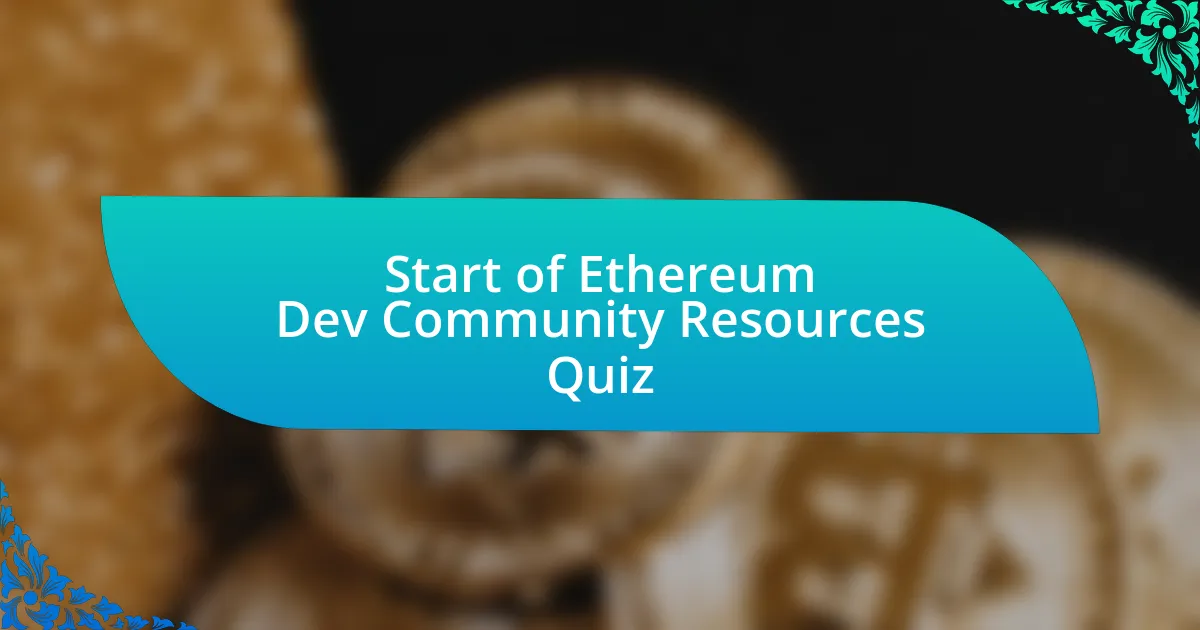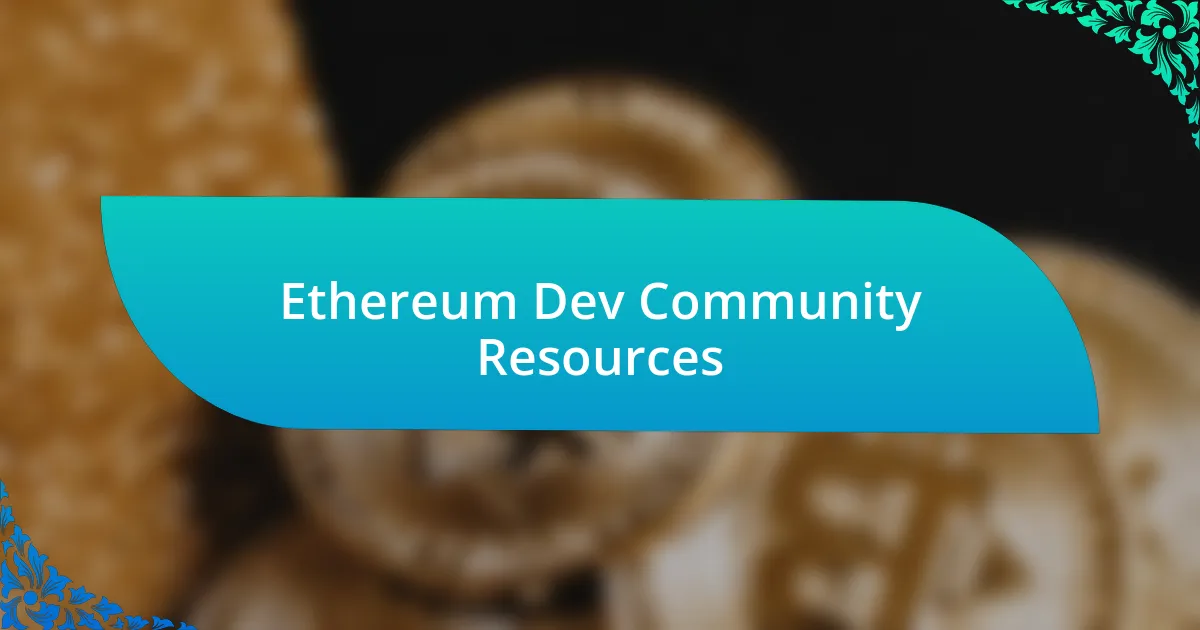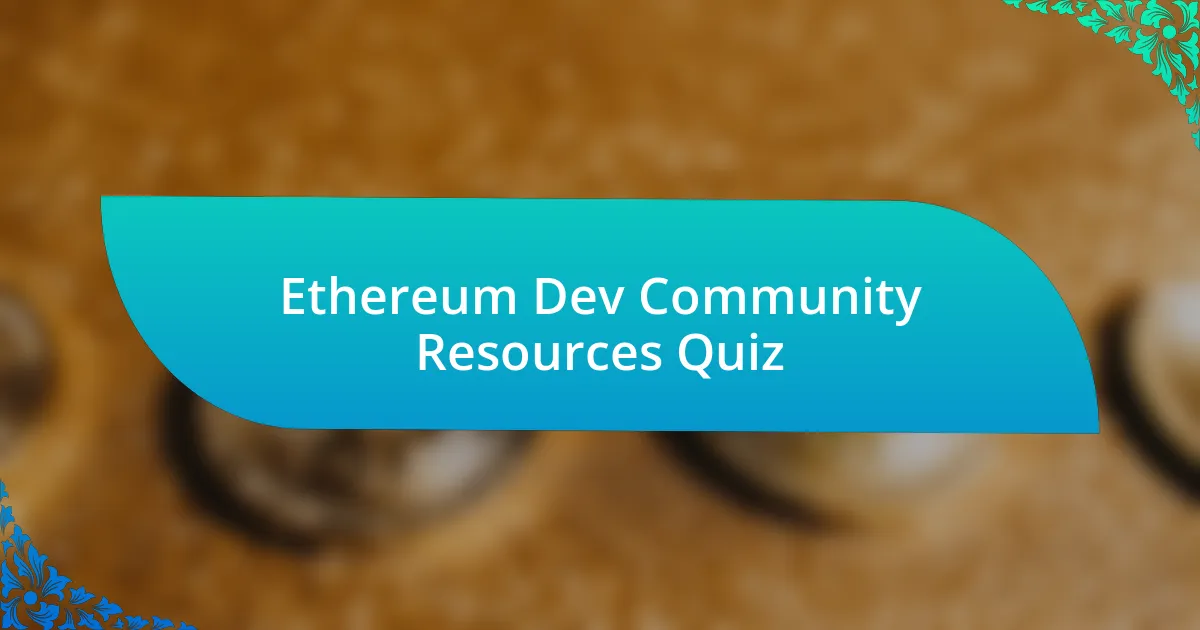
Start of Ethereum Dev Community Resources Quiz
1. What is the Ethereum Developer Portal & Training?
- A place to get started and find tools to develop and build applications on the Ethereum blockchain.
- A social media platform for Ethereum enthusiasts to share news.
- A marketplace for buying and selling Ethereum tokens and NFTs.
- A forum for discussing general blockchain topics and technologies.
2. What resources can you find on the Ethereum Developer Portal & Training?
- Ethereum Travel Applications, Ethereum Job Boards, Ethereum Real Estate
- Ethereum Healthcare Systems, Ethereum Cryptocurrency Trading, Ethereum Music Platforms
- Ethereum Knowledge Bases, Ethereum Infrastructure, Ethereum IDEs and Editors, Ethereum Smart Contracts
- Ethereum Art Galleries, Ethereum Social Media Tools, Ethereum Virtual Reality
3. What role does Kauri play in the Ethereum community?
- A game platform built on the Ethereum blockchain.
- A platform used by the Ethereum community to vet, curate, and store high-quality content.
- A cryptocurrency wallet for storing Ethereum assets.
- A decentralized exchange for trading cryptocurrencies.
4. What is the function of the Ethereum 2.0 Beacon Chain?
- The main wallet for storing Ethereum assets.
- A social platform for Ethereum developers to collaborate.
- The primary trading exchange for Ether transactions.
- The base that manages Ethereum 2.0 validators and network consensus.
5. As of May 2021, what was the total value in the DeFi ecosystem?
- Over $100 billion in collateral.
- Over $25 billion in collateral.
- Over $50 billion in collateral.
- Over $75 billion in collateral.
6. Describe the Ethereum Developer Bootcamp.
- A short workshop on blockchain basics.
- A beginner`s guide to Bitcoin mining.
- An introductory webinar about cryptocurrency trends.
- A comprehensive course that teaches you the fundamentals of Ethereum development from 0 to 100.
7. How extensive is the Ethereum Developer Bootcamp in terms of lessons?
- 45 lessons
- 91 lessons
- 30 lessons
- 120 lessons
8. What intermediate skill level is needed for the Ethereum Developer Bootcamp?
- Beginner skill level with a Python pre-requisite
- Expert skill level with no pre-requisites
- Intermediate skill level with a JS pre-requisite
- Advanced skill level with a C++ pre-requisite
9. How many students have enrolled in the Ethereum Developer Bootcamp?
- 20K enrolled students.
- 10K enrolled students.
- 14K+ enrolled students.
- 5K enrolled students.
10. What topics are covered in the Ethereum Developer Bootcamp curriculum?
- Cryptography, smart contracts, dApp development, coding challenges, videos, written guides, weekly projects.
- Blockchain theory, database management, web design, project management.
- Social media marketing, cybersecurity protocols, cloud computing techniques, data analysis methods.
- Mobile app development, machine learning fundamentals, marketing strategies, user interface design.
11. What is the capstone final project in the Ethereum Developer Bootcamp?
- A portfolio showcasing various Ethereum applications.
- A group project on Solidity contract testing.
- A capstone final project which can be submitted for official Alchemy certification.
- A collaborative effort to create a crypto game.
12. What is the purpose of joining the Alchemy Discord for bootcamp participants?
- To get the max bootcamp experience.
- To participate in social gaming events.
- To access exclusive job postings.
- To receive tutorial videos each week.
13. Who is Dan McKeon and what did he achieve in Ethereum development?
- Dan McKeon is a marketing expert who promoted Ethereum to new users.
- Dan McKeon is a researcher who published papers on Ethereum`s scalability.
- Dan McKeon is a blockchain architect who built the Ethereum Foundation`s website.
- Dan McKeon is a Full Stack Ethereum Developer who transitioned from web2 to web3 and landed his dream job.
14. What does the expert guide on Ethereum interview questions address?
- A comprehensive introduction to Ethereum blockchain technology.
- A technical manual for building Ethereum applications.
- A summary of Ethereum’s market trends and prices.
- An expert guide that covers the most popular interview questions for Ethereum.
15. Why has the demand for Ethereum developers surged?
- Many firms are discontinuing their blockchain projects.
- Many companies are looking for professionals who are experts in Ethereum development.
- There is a steady decline in interest for cryptocurrency technologies.
- Ethereum developers are not significant for business growth.
16. Who originally authored Ethereum?
- Charles Hoskinson
- Vitalik Buterin
- Satoshi Nakamoto
- Roger Ver
17. What does EVM stand for?
- Enterprise Video Manager
- Ethereum Virtual Machine
- External Verifiable Middleware
- Electronic Value Marketer
18. What is the value token associated with Ethereum?
- Ether (ETH)
- Ripple (XRP)
- Litecoin (LTC)
- Bitcoin (BTC)
19. How can Ethers be mined?
- One needs to have a wallet and tools such as Geth CLI, participate in the Network, and help add transactions to the blocks.
- Installing a special application on your phone and sending requests to miners.
- Creating an Ethereum account and collecting points through surveys.
- Buying Ether directly from an exchange and waiting for a confirmation.
20. What is MetaMask used for?
- A file storage service for securely keeping documents online.
- A popular browser-based Ethereum wallet used to interact with dApps on the Ethereum network.
- A cryptocurrency trading platform for buying and selling stocks.
- A social media app for connecting with friends and sharing updates.
21. What is Truffle in the context of Ethereum development?
- A decentralized exchange platform for trading Ethereum tokens.
- A programming language designed for writing Ethereum smart contracts.
- A popular testing and development environment for Ethereum that offers an asset pipeline.
- A mobile wallet application specifically for storing Ethereum.
22. What are the block time and average block size for Ethereum?
- Block time is 30 seconds, and the average block size is 1 MB.
- Block time is 3 seconds, and the average block size is 10 KB.
- Block time is 1 minute, and the average block size is 500 KB.
- Block time is 14 seconds, and the average block size is 2 KB.
23. Are Ethereum transactions kept hidden on the public network?
- Yes, they are private and encrypted.
- No, all transactions are public.
- Yes, they are hidden from view.
- No, they can only be seen by miners.
24. How is a user’s private key utilized in transactions?
- The user’s private key is used to sign transactions.
- The user’s private key is used to manage Ethereum nodes.
- The user’s private key is used to unlock public wallets.
- The user’s private key is used to encrypt data transfers.
25. How can you recover an Ethereum account without a private key?
- Using the 12-word mnemonic set during account creation.
- Through a network of Ethereum miners.
- By resetting the account via an email link.
- By contacting Ethereum support for assistance.
26. What function does Geth serve in the Ethereum network?
- A game development tool for Ethereum.
- A graphic user interface for mobile wallets.
- A command-line interface used when running a full Ethereum node.
- A payment processing platform for transactions.
27. What methods can be used to connect to an Ethereum node?
- Using TCP-RPC, XMPP-RPC, or SNTP-RPC.
- Using Spot-RPC, QR-RPC, or AB-RPC.
- Using HTTP-RPC, FTP-RPC, or FTP-RPC.
- Using WS-RPC, JSON-RPC, or IPC-RPC.
28. What does Geth`s fast sync achieve?
- Downloading large files quickly.
- Clearing cache for better performance.
- Syncing the download transaction.
- Establishing a secure connection.
29. What is the main functionality of Testnet?
- Creating new tokens for public use.
- Testing applications without real Ether.
- Generating real transactions for user wallets.
- Verifying smart contracts on the main chain.
30. Is real Ether required to test dApps and smart contracts?
- Yes, real Ether is required for all tests.
- No, tests can`t be done without real Ether.
- Yes, only real Ether can verify contracts.
- No, free Ether can be used in test networks.

Congratulations! You’ve Successfully Completed the Quiz
Thank you for taking the time to complete our quiz on Ethereum Dev Community Resources. We hope you found the questions engaging and the material insightful. It’s always rewarding to test your knowledge and discover new facts, especially in a constantly evolving field like blockchain development. Whether you are a beginner or an experienced developer, each question provided an opportunity to learn more about the vibrant Ethereum community.
Throughout the quiz, you may have gained a better understanding of the resources available for Ethereum developers. From forums and tutorials to documentation, there are many avenues to explore. Each resource plays a crucial role in helping developers navigate the complex landscape of Ethereum and improve their skills. The tools you now know about can significantly enhance your development journey.
If you’re eager to dive deeper into the world of Ethereum development, we invite you to check out the next section on this page. Here, you will find an array of resources designed to expand your knowledge even further. Whether you’re looking for guides, community forums, or cutting-edge tools, this section has something to support your learning and growth in the Ethereum ecosystem. Happy exploring!

Ethereum Dev Community Resources
Overview of Ethereum Developer Resources
Ethereum developer resources encompass a broad range of tools, documentation, and communities aimed at assisting developers in building and maintaining applications on the Ethereum blockchain. These resources include official documentation, open-source libraries, development frameworks, and community forums. They serve as a foundation for understanding the Ethereum ecosystem and facilitate the onboarding of new developers.
Official Ethereum Documentation
The official Ethereum documentation is a vital resource for developers. It provides comprehensive guides on various topics, including Ethereum’s architecture, smart contract development, and network usage. This documentation is maintained by the Ethereum Foundation and serves as the authoritative source of knowledge for developers seeking to understand protocols and best practices. The documentation is regularly updated to reflect changes in the ecosystem.
Development Frameworks and Tools
Development frameworks such as Truffle, Hardhat, and Remix are essential tools in the Ethereum developer community. They streamline the smart contract development process, offering features like testing, deployment, and debugging tools. These frameworks cater to different stages of development and enhance productivity by simplifying complex workflows. Their popularity is evident as they are widely adopted in the Ethereum development landscape.
Community Support and Forums
Ethereum developer communities, such as Ethereum Stack Exchange and Reddit’s Ethereum community, provide platforms for discussion, troubleshooting, and collaboration. Developers can ask questions, share knowledge, and collaborate on projects. Such forums foster a supportive environment and build a sense of community among developers. Access to collective knowledge aids in overcoming challenges in development and promotes innovation.
Online Learning Resources and Tutorials
Online learning platforms and tutorials are invaluable for developers looking to upskill in Ethereum development. Websites like CryptoZombies and Solidity documentation offer interactive lessons on smart contract programming. Videos, articles, and courses made by experienced developers help new and seasoned programmers understand critical concepts and keep up with the latest trends in Ethereum development. These resources are often free and accessible, encouraging continuous learning.
What are Ethereum Dev Community Resources?
Ethereum Dev Community Resources are tools, platforms, and materials designed to support developers working with the Ethereum blockchain. These resources include online forums like Ethereum Stack Exchange, documentation on the official Ethereum website, open-source projects on GitHub, and educational content from platforms such as ConsenSys Academy. They play a crucial role in fostering collaboration, knowledge sharing, and skill development among Ethereum developers.
How can developers access these resources?
Developers can access Ethereum Dev Community Resources by visiting online platforms such as the Ethereum Foundation’s official website, GitHub repositories, and community forums. These resources are typically available free of charge. Additionally, attending Ethereum meetups or conferences can also provide direct access to workshops and community-driven discussions about ongoing projects.
Where can developers find community support for Ethereum?
Developers can find community support for Ethereum on platforms like Discord channels, Reddit forums, and Telegram groups dedicated to Ethereum development. The Ethereum Stack Exchange also offers a question-and-answer format for developers seeking assistance. These spaces encourage interaction and peer support, making it easier to troubleshoot issues and exchange ideas.
When did the Ethereum Dev Community begin to form?
The Ethereum Dev Community began to form in late 2013, coinciding with the initial announcement of Ethereum by Vitalik Buterin. The platform launched its first version, Ethereum Frontier, in July 2015. Since then, the community has continuously grown, fueled by developers’ interest in blockchain technology and decentralized applications (dApps).
Who are the key contributors to the Ethereum Dev Community?
Key contributors to the Ethereum Dev Community include Vitalik Buterin, co-founder of Ethereum; Joseph Lubin, founder of ConsenSys; and various developers who contribute code and resources through GitHub. Community-driven organizations like the Ethereum Foundation also play a significant role in fostering development and providing educational resources, thereby nurturing a vibrant ecosystem.

